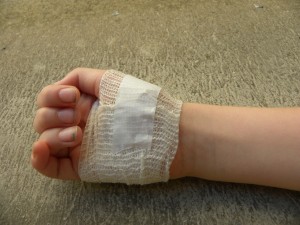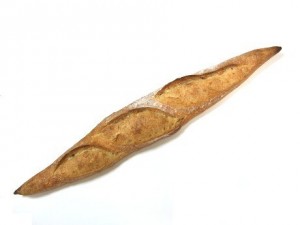You don’t know how foreign a country is until you experience it with a sick child.
Last Friday, Ella had a throbbing pain in her right palm. She couldn’t sleep, and her face was red with fever.
Where would we go? Weren’t Parisian doctors at the beach for all of August? The whole city seemed emptied for les vacances.
We finally found a doctor, not the one recommended by our friends who lived here last year (she was on vacation, of course), but another, one Metro transfer away. She gave us an appointment for an hour later.
On the Metro we sat next to a girl clutching a flowered backpack, in shorts and sneakers, traveling by herself. Ella didn’t agree that the girl looked about nine. Maybe Ella thought if she admitted that girls her own age rode the Metro alone, I might make her do the same.
I was surprised when Dr. Masson greeted us herself, the receptionist perhaps at the beach with the rest of Paris. We waited only ten minutes, less than I would expect in the U.S. Dr. Masson asked a few questions and typed our answers into her computer. Ella explained (in English) that she will soon start attending a bilingual school, where she will learn French. “But surely you know some French,” the doctor continued, in French. “No.” That’s all she said, but I inferred, “Ask me to try any other day, when I’m not sick.” During our week in Paris so far, she had been showing off, talking to shopkeepers and waiters, asking for directions to the bathroom by herself. But not today.
“Has she ever had des verrus?” the doctor asked, examining Ella’s palm. “I don’t know that word,” I said, looking it up. “No, she’s never had warts. I think it’s an old splinter.” Une echarde. I’d looked up that word before I left our apartment. “I think the splinter caused an infection, c’est pourquoi she has a fever.”
The doctor pulled a few squat bottles and long syringes from a drawer. “It’s just like at the dentist,” she said to Ella, as if this would reassure her. “I’ll give you a shot, so you won’t feel a thing.” Ella has never gotten a shot from a dentist, since she doesn’t have cavities. But that’s not why she gave me a puzzled look. It’s because she didn’t understand a word.
So I translated. The doctor numbed part of Ella’s hand and pulled out a scalpel. “You feel my finger ici?” the doctor asked. “Does it hurt where she’s touching you?” I translated. “Yes,” Ella said. So the doctor gave her another shot, more local anaesthesia. Finally, “Ici? Ici?” asked the doctor. “Here? Here?” “No,” Ella said. Then she sucked in her breath and bit her lips at the sight of the knife: the same response in any language.
The doctor excavated two splinters and displayed them to us. “You want to take them home or put them in la poubelle?” “The garbage,” Ella said.
“When you take this to the pharmacy,” the doctor said, handing me the prescription, they might tell you it’s wrong, but it’s not. She needs a very strong antibiotic for a very bad infection.”
“It’s a very bad infection?” I asked, not translating for Ella, hoping she wouldn’t worry too much.
“It’s not so bad yet,” the doctor said, but it’s close to an artery that leads to the heart.”
We paid and thanked her, then walked out onto rue Violet.
“Close to the heart,” Ella echoed the doctor, leaning against me on the Metro, glad, I’m sure, to be with her mother and her mother tongue, in a city so big, with a language so new and strange.
So she’d understood, after all. At least a little bit. Maybe she thought she’d be left on her own, like the little girl on the train, if she could follow the doctor’s words without help. “We caught the infection in time,” I said, hoping Ella inferred “I’ll never leave you alone,” as we sped above ground, the Tour Eiffel looming out the window, our breath synchronized, as I held her against my chest. Close to the heart.



